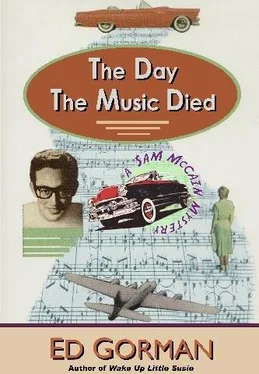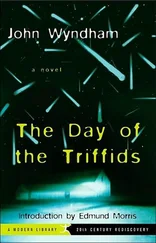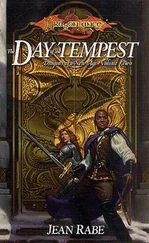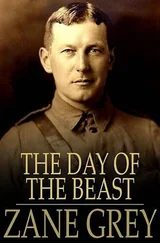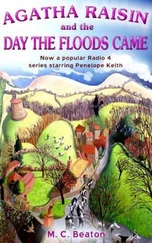Ed Gorman - The Day The Music Died
Здесь есть возможность читать онлайн «Ed Gorman - The Day The Music Died» весь текст электронной книги совершенно бесплатно (целиком полную версию без сокращений). В некоторых случаях можно слушать аудио, скачать через торрент в формате fb2 и присутствует краткое содержание. Жанр: Криминальный детектив, на английском языке. Описание произведения, (предисловие) а так же отзывы посетителей доступны на портале библиотеки ЛибКат.
- Название:The Day The Music Died
- Автор:
- Жанр:
- Год:неизвестен
- ISBN:нет данных
- Рейтинг книги:3 / 5. Голосов: 1
-
Избранное:Добавить в избранное
- Отзывы:
-
Ваша оценка:
- 60
- 1
- 2
- 3
- 4
- 5
The Day The Music Died: краткое содержание, описание и аннотация
Предлагаем к чтению аннотацию, описание, краткое содержание или предисловие (зависит от того, что написал сам автор книги «The Day The Music Died»). Если вы не нашли необходимую информацию о книге — напишите в комментариях, мы постараемся отыскать её.
The Day The Music Died — читать онлайн бесплатно полную книгу (весь текст) целиком
Ниже представлен текст книги, разбитый по страницам. Система сохранения места последней прочитанной страницы, позволяет с удобством читать онлайн бесплатно книгу «The Day The Music Died», без необходимости каждый раз заново искать на чём Вы остановились. Поставьте закладку, и сможете в любой момент перейти на страницу, на которой закончили чтение.
Интервал:
Закладка:
I followed Pamela into the judge’s chambers.
Before I’d even crossed the threshold, two familiar scents obliterated Pamela’s perfume, the odors of Gauloise cigarettes -yes, the ones in the blue packages French people always smoke while they’re talking in subtitles after having sex-and Eiffel Tower brandy.
Except for when she’s in court, you seldom see the judge without a Gauloise and a snifter of brandy on her desk.
Esme Anne Whitney was born in New York City a decade or so before the turn of the century. She’d been schooled abroad for the most part-London, Paris, Rome-all before she was fifteen, when her parents died in a train accident. She was then sent out here to live with her oldest brother, a fairly decent guy as Whitneys go, an honest politician and a man who seemed to have some genuine concern for those less lucky than himself. He ended up as a judge and influenced Esme to attend law school at the University of Iowa. She would have preferred Yale or Harvard but her brother had taken sick and she wanted to be around him. Three years out of law school, she used her influence with then President Coolidge to get herself appointed to her ailing brother’s seat on the bench. She has been there ever since.
She’s an elegant woman. She buys all her clothes in New York and it shows. She’s slender to the point of emaciation, Romanesque in the brazen jut of nose and the impudence of eyes and upper lip. Her head would look great in profile stamped on a silver coin. She wears her graying hair cropped close and only enough makeup to lend drama to her already dramatic features. Her speech is as eccentric as her Gauloises, a touch of Kate Hepburn, a dollop of Ayn Rand, whose books fill the glass bookcase behind her massive leather executive chair.
This afternoon, she wore a gray fitted suit, gray hose and black pumps. She had nice legs. She was propped on the edge of her vast desk, the smoke in one hand, the brandy in the other.
She was speaking to an austere man with white hair and a bad complexion. He wore a blue blazer, white shirt, regimental striped tie, gray slacks. On his blazer pocket, was a fancy crest. Bob Frazier was the only man in the county Judge Whitney would even consider a social peer. Though he was local money-his father having owned outright as many as four short-line railroads at one time-he’d spent most of his school years in London, ending up at Oxford.
I probably would have felt sorrier for him if he hadn’t left his daughter alone for months at a time when she was a young girl. She’d always been a nice kid, but she had a desperate edge. You get that way when you don’t have a parent in your life.
“Bob, for God’s sake,” the judge was saying, “if you want me to say that my nephew, Kenny, was a shit, of course he was a shit.
You don’t really expect me to sit here and deny that, do you? But beyond admitting it, what else can I do about it? I’m sorry; I’m very, very sorry it happened.”
“Excuse me,” Pamela said before Frazier could respond. “I brought some more coffee. Fresh.”
“Thank you, dear,” the judge said. “So pour us some fresh and get the hell out of here.”
“Yes, Judge.”
To me, she said, “You’re late.”
I didn’t have time to say anything. I just sat down in the leather chair next to Frazier’s. He briefly scowled in my direction. I’d never liked him but now that his daughter was dead, I felt vaguely guilty about not liking him. While Pamela poured everybody coffee, I sat there and tried hard to work up some good feelings for him.
I didn’t have much luck.
“Now, you have some brandy in this one, Bob,” the judge said. Pamela had handed her a cup and saucer. The judge picked up the brandy bottle and poured in a good shot and handed the cup to Bob.
The judge dispensed brandy-and-coffee the way priests dispensed communion.
“It’s too early,” Frazier said.
“The hell if it is,” the judge said.
“Now hold your cup out and quit being a baby.”
“Damn it, Esme, there’s never any arguing with you, is there?” Frazier said, but he held his cup out. The judge gave him a bracing shot. No matter how strong your resolve, was, the judge would triumph.
“What you need to do,” the judge said, “as soon as the funeral is over is get the hell out of here. And I mean far away. Have you ever been to Bermuda?”
“Once. They were having some kind of political trouble there. And some kind of big bug bit my girlfriend on the ass. Pardon my French.”
“Which girlfriend?”
“Darla.”
“Did the bug get poisoned?” the judge asked sweetly.
“She never liked you any better than you liked her,” Frazier said. Then he made a fist. And his eyes shone with tears. “My daughter was a good, sweet girl and that son of a bitch completely corrupted her. Completely.”
On the words “good, sweet girl,” the judge looked at me and rolled her eyes. His daughter, Susan, whom I’d liked, probably hadn’t been an ideal girl. She slept around a lot and had a few minor fracases with Sykes’ hillbilly gestapo.
But she was a sweet and tender and honest girl, giving a lot of free hours to the hospital and to one of the local vets. She was like a lot of local people, she saw helping out as part of the price you paid for the privilege of living here.
Frazier suddenly set his cup down and half-leaped to his feet. He walked over to the regal red drapes keeping out the afternoon sun. He parted the drapes and looked out. The sun exposed the rough acne of his face. Mid-fifties, and his complexion had never cleared up. But somehow, with the white hair and the sharply pointed nose, the affliction only enhanced his predatory air.
Still staring out the window, he said, “She was my life. She was all I cared about.”
The judge gave me another one of her skeptical looks but let him go on.
He turned back to look at her. “I don’t have to tell you that I was opposed to this marriage.”
“Oh, don’t worry, Bob. I remember how much you were against it.”
“Kenny was a jackass.”
“That he was.”
“And the idea that he’d run around on a young woman as beautiful and gentle as my daughter-”
He shook his white-maned head and for the first time I felt sorry for him. I wondered now if he was reliving everything his mother had put his father through. Her affairs were the stuff of local legend. She’d been the artsy-type, involved in theater productions and arts festivals and outdoor musicales, as they are called. She’d spent a good deal of her time at a downtown store called Leopold Bloom’s, after the James Joyce character. She was his first wife and no one could blame him for finally divorcing her. But then he pretty much married the same woman three times over.
Frazier came back to his chair. He looked old and weak now. The sunlight had apparently put him in a better mood. He said, “You’re right, Esme. I want to punish somebody. It’s just like Kenny to kill himself. The bastard couldn’t face what he’d done, so he took the easy way out.”
“I don’t think he killed her,” I said.
They both looked at me.
“What the hell’re you talking about?” Frazier said.
I glanced at the judge. “I don’t think he killed her. I don’t know why I say that-it’s just an instinct, I guess. He was so drunk, he thought he might have killed her. But I think somebody else was there with them right before I came.”
“And of course you don’t have any idea who?” he said.
“Not yet, I don’t.”
“I can’t think straight,” he said to the judge.
“I don’t even know what the hell he’s talking about.”
“Neither do I, Bob,” she said, sounding peeved as only the judge can sound peeved. “But believe me, I’m going to find out.”
Читать дальшеИнтервал:
Закладка:
Похожие книги на «The Day The Music Died»
Представляем Вашему вниманию похожие книги на «The Day The Music Died» списком для выбора. Мы отобрали схожую по названию и смыслу литературу в надежде предоставить читателям больше вариантов отыскать новые, интересные, ещё непрочитанные произведения.
Обсуждение, отзывы о книге «The Day The Music Died» и просто собственные мнения читателей. Оставьте ваши комментарии, напишите, что Вы думаете о произведении, его смысле или главных героях. Укажите что конкретно понравилось, а что нет, и почему Вы так считаете.
